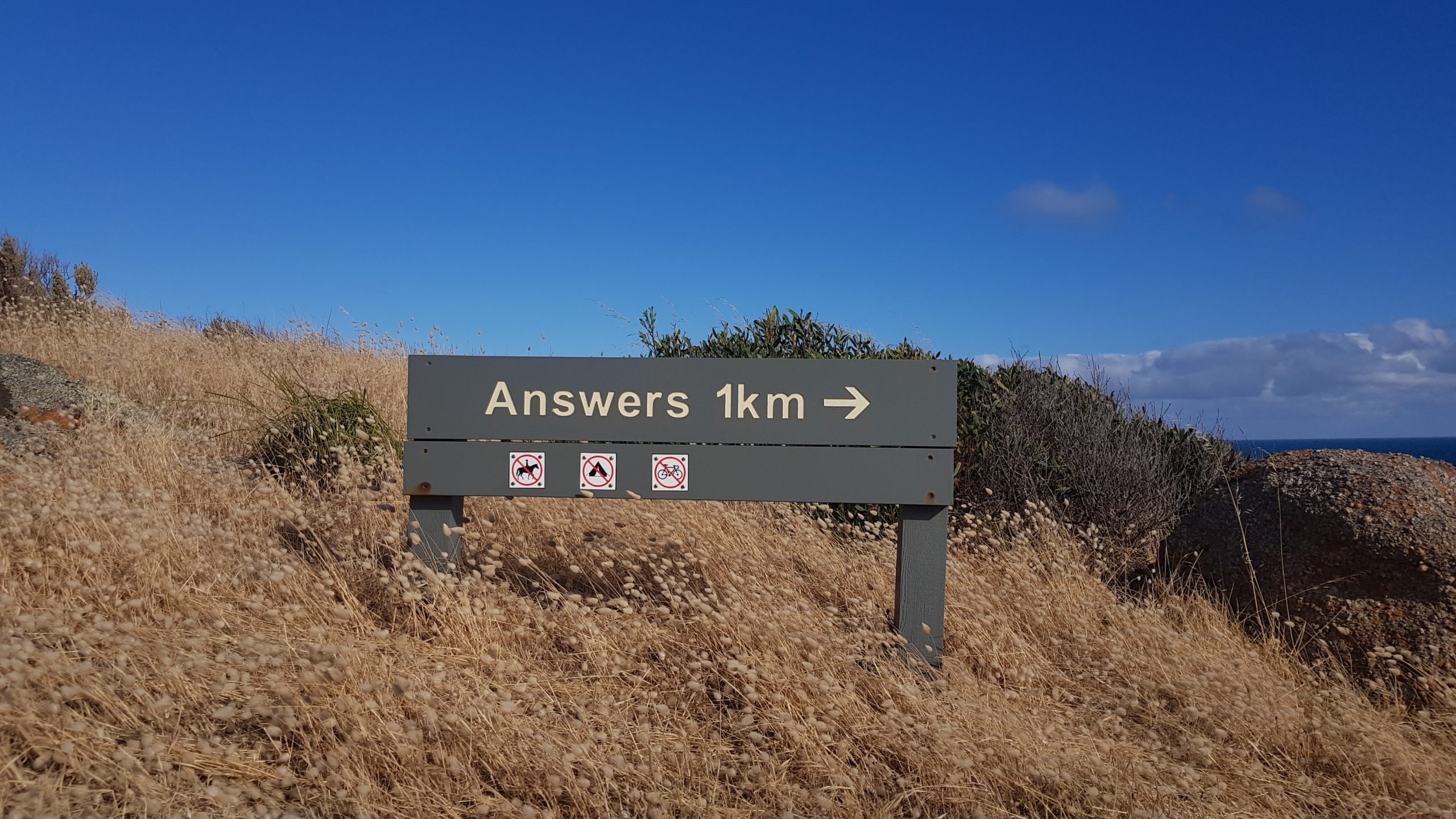
Leadership
The Power of a Great Question
We all know we should ask good questions. The problem is that a lot of the time we don’t do it. We default to the things that are more comfortable. When I’m teaching coaching skills to leadership, I often have them do a very simple exercise. Advice versus open ended questions In pairs, they take turns listening to a colleague, but in the first round, they do it with the hat of a mentor. They can give advice. And boy do they. These conversations typically descend into, “here’s what I’ve tried that’s worked. You should do this.” I hear loads of closed ended questions, lots of yeses and nos as they probe their colleague for what they tried and what they didn’t try. In the second round, they can’t give any advice, and only can ask open ended questions. (An open-ended question is one that can’t be answered with a yes or a no just in case you were wondering.). They really struggle with this one. But during the debrief, the folks with the issue typically report that the latter exercise, the one where only open-ended questions could be asked, was the one that really expanded their thinking or got them to see something from a different perspective. Why are open ended questions so powerful? I’ve often seen the light bulb go off after I debrief this exercise. If I’m asking an open-ended empowering question, the person on the receiving end comes to their own conclusion, not the conclusion that I think could be best for them. The benefit of this is that the person being questioned takes more ownership of whatever the solution is. Have you ever had a great piece of advice which you willingly gave to someone and just couldn’t understand why they didn’t take the idea and run with it? Well, it may have been great for you, but it probably wasn’t great for them. The ability to create one’s own solution creates natural by-in in the problem-solving process. It gives the person with the problem a sense they also have autonomy, which is something that greatly motivates folks and many of us desperately crave this in our work. I can’t tell you how many coaching clients I’ve had who are looking to leave a job who say they don’t have enough creativity in their work. They feel micromanaged. They feel condescended to. It’s not surprising considering it’s sometimes just easier in the short run to “tell” someone how they should do something. The problem is that this way of communicating creates loads of longer-term issues. Powerful open-ended questions also create engagement. If I’m telling someone what I think they should do, how engaged do you really think they will be in the conversation? Asking a powerful open-ended question opens the dialogue, I am engaging this person on a deep level, getting them to think critically and creatively about the issues they face. And if you don’t think engagement is important, think again. According to Gallup, […]
May 11, 2022
|
4.5 min read
empowering questions
Shelley Pernot, otherwise known as the Irreverent Guru of Mindfulness, muses on life, leadership and everything in between. Your one stop shop for career tips, leadership tips and daily inspiration!

It was a privilege to work with Shelley as my leadership coach! The process was structured and yet flexible enough to meet needs as they arose. Shelley helped me to grow, learn more about myself, and to really achieve what I set out to accomplish. We worked on planning, navigating a promotion successfully, and so much more! I experienced many successes as a result of working with Shelley, she has great resources, knowledge, and really helps with setting the foundation to this coaching work. She won’t let you down!
Stacy Campos
Regional Coordinator
Having the opportunity to have Shelley as my Leadership Coach could not have come at a better time in my career. I was recently promoted to CFO and was new to the Senior Management Team. Shelley helped me navigate joining the team as well as helped me to determine who I wanted to be as a leader. The Leadership Circle Profile helped our team to discover our blinds spots and to be able to understand each other better. Working with Shelley not only has affected my professional life in a positive way, but also my personal life. She helped me take leaps and has given me the resources to continue this journey of self-improvement. If you’re looking to find more about yourself and how you can be the best version of yourself, I highly recommend working with Shelley.
Kristen Spedale
CFO
I have been working with Shelley for the past 2 years on my leadership development journey. What I thought would be a straight line, I soon learned with Shelley’s guidance, was a winding path with several ups and downs along the way. Shelley supported me as I took a deep dive into my professional and personal history and learned how it affects my approach and my perceptions. She helped me to slow down and recognize certain behaviors and understand that I can pivot in the moment or try again next time. Ultimately, my work with Shelley turned out to be so much more than what I expected. Her approach to coaching was exactly what I needed.
Nicole Naassan
Senior Vice President, Consulting
I’ve learned more about leadership in the past six months working with Shelley than I have in my 10+ year career. She is an incredible coach with many tools in her toolbox. The guidance and mentorship I’ve received from Shelley has been life-changing. She will challenge your limiting beliefs and inspire new ways of thinking.
Margaret Soltis
Creative Director
I highly recommend Shelley if you need a coach, thought partner, and guide as you consider the next steps in your career. She provides practical tools and advice to help launch your career exploration, but most importantly, she is an expert at helping you cut through the noise of your limiting beliefs. At the end of our time together, I had a much clearer vision of what I wanted in my life and a plan to make it happen. My only regret is that I didn’t find her sooner!
Elizabeth Magnus
My career coaching sessions with Shelley have brought me back to living. It’s been contagious, spreading throughout my personal and professional life. I now have the building blocks I need to continue setting healthy boundaries, the freedom to show up as my authentic self, and an adaption of a growth mindset that has allowed me to make bold decisions and try new things. I’ve discovered that there’s always another way and how to eradicate barriers that lead to tunnel vision. These sessions with Shelley have been a great gift and have given me the momentum I need to continue the journey to be my best self.
Teasha Houston
Art Director
It is amazing to think where I was only 10 months ago when I first started working with Shelley and where I am now. Not only professionally but mentally and emotionally. Shelley helped me navigate out of an unhealthy work environment by challenging me and asking me those tough questions we never seem to ask ourselves. What are the values of a true leader? How do those values align with my own? Shelley challenging me and guiding me through some of those tough questions is what led to my epiphany and me having the courage and confidence to leave an environment that threatened my well-being. She taught me how to become more self-aware and self-compassionate. Reminded me to be kind even when the world would understand if I did otherwise. And the biggest one for me, shutting down that crazy inner voice (we all have it!) and replacing it with being present. Shelley has armed me with tools that I will carry with me for a lifetime. Tools that will help me to continue to grow and learn. Life can be hard but working with someone like Shelley does make it easier. She will help you navigate the good and the bad and you’ll learn so much about yourself in the process.
Michele Feria
Director of Marketing
First of all I would like to say that I would recommend Shelley to anyone needing career guidance. As my counselor Shelley helped me transition my career from bartending to Tech Sales which was a difficult and scary transition for me. From the start Shelley was fantastic. Initially I had no idea of which direction I wanted my career to go, I just knew I wanted it to go somewhere else. Shelley was so kind and patient as she helped me figure this out, and gave me a step by step guide on how to explore my options and make an educated decision. She also helped me assess my skill set which played a large part in directing my energy. I landed a great job within days of my final session with Shelley, and now I’m month 3 I am absolutely loving it and doing very well. It was the perfect job for me and Shelley was the one that got me there. Working with Shelley was one of the best decisions I have ever made, she literally changed my life and I am so much happier for it.
Russell Boxer
Account Executive
